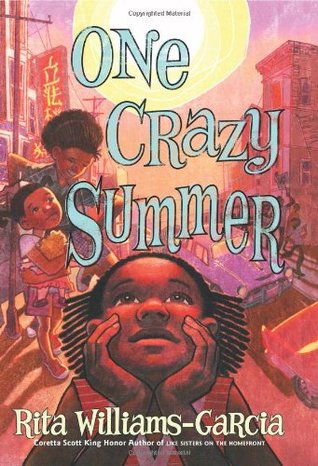 Wow. This book is real, contemporary children's literature. The writing has a rhythm to it, a kind of no-nonsense lyricism.
Wow. This book is real, contemporary children's literature. The writing has a rhythm to it, a kind of no-nonsense lyricism.
Set in 1968, the Gaither sisters - Delphine (11), Vonetta (9), and Fern (7) - are sent by themselves to spend a summer with their mother Cecile, who left them and their father when Fern was just a baby. The story is narrated by Delphine, and her voice is authentic and straightforward - there's no sugar-coating here. While Papa and Big Ma (their paternal grandmother) in Brooklyn have raised the girls to be ever-mindful of their place as "Negroes" and "colored" children, suddenly they find themselves in Oakland, CA, at the center of the Black Panther party, where they learn that everyone else around them is unabashedly "black" out loud.
I have a working knowledge of the Black Panthers, but I admit, never once before had I considered the question, "What about the children?" Surely there were children coming of age at this time, witnessing the police brutality and the Black Panthers' militant open-carry of rifles. How did they process the world around them?!
There's a lot that can be considered controversial in this book. Delphine is wary of the guns and secrecy of the Black Panthers, and she knows Big Ma doesn't like them, yet she gets caught up in the feelings of empowerment. Are they victims of propaganda? Maybe. But they are learning about justice, and their own identities. It occurs to me that the Black Panther summer camp they attend might not be so different from vacation bible schools sponsored by churches, with activities to engage children and also a specific message to deliver. Anyway, while Papa and Big Ma are deferential and careful around police officers, in Oakland they see black people being outrightly defiant, even calling the police "racist pigs". There is no "good cop" to counter the "bad cop" narrative. Also, it's just a raw depiction of hard lives: the Gaither sisters grow up without a mother, their mother shows no interest in them, and we eventually learn about Cecile's heartbreaking history.
For all those reasons, I'd consider this book most appropriate for middle school readers, or at least preteen readers. Even though the reading level and the characters themselves are suitable for upper elementary readers, I think there's just so much going on in this book, that a little more maturity and worldliness can help the reader to more fully understand and appreciate the events, the characters, and the exploration of race. Overall, an important read for any American, especially those interested in social justice.


No comments:
Post a Comment